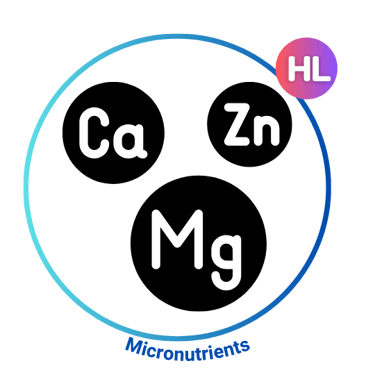





Micronutrients may be required in only small quantities, but their impact on physiological function is profound. According to the new IB SEHS specification, students are expected to identify and explain the key roles of vitamins and minerals in the body, understand their contribution to health and performance, and recognise the effects of deficiencies and imbalances. This content promotes a comprehensive understanding of nutrition as a foundational element for physical activity, recovery, and overall well-being.
Micronutrients are categorised into two primary groups: vitamins and minerals. Unlike macronutrients (carbohydrates, proteins, and fats), micronutrients do not provide energy; however, they are essential for numerous metabolic processes, including oxygen transport, immune function, bone formation, and energy metabolism.
Vitamins are organic compounds and are either water soluble (B complex and C) or fat soluble (A, D, E, and K). Water-soluble vitamins must be consumed regularly, as they are not stored in the body. B vitamins, for example, are critical in energy production, particularly B1 (thiamine), B2 (riboflavin), B3 (niacin) and B6, which help metabolise carbohydrates and proteins during exercise. Vitamin C supports immune function and the synthesis of collagen, which is vital for tissue repair.
Fat-soluble vitamins are stored in adipose tissue and the liver. Vitamin D, synthesised in the skin via sunlight exposure, plays a central role in calcium absorption and bone health. Deficiencies can lead to weakened bones and an increased risk of injury. Vitamin A supports vision and immune function, while vitamin K is essential for blood clotting. However, because they are stored, fat-soluble vitamins can accumulate to toxic levels if consumed excessively, a key consideration when using supplements.
Minerals are inorganic elements required for structural and functional roles. Calcium, phosphorus, and magnesium are critical for bone health and muscular function. Calcium also plays a vital role in nerve transmission and muscle contraction. Iron is essential for haemoglobin and myoglobin formation, oxygen-carrying proteins in blood and muscle, and is therefore vital for aerobic performance. Iron deficiency, widespread in endurance athletes and menstruating females, can impair oxygen transport and reduce exercise capacity.
Other important minerals include:
Sodium, potassium, and chloride (electrolytes): regulate fluid balance, nerve function, and muscle contraction, crucial during prolonged exercise and sweating.
Zinc: supports immune function and wound healing.
Iodine: vital for thyroid hormone production and metabolic regulation.
Deficiencies in key micronutrients can arise from poor dietary choices, restrictive eating, high training volumes, or specific physiological demands (such as menstruation, growth, or illness). Even mild deficiencies may compromise immunity, delay recovery, and impair performance. Conversely, over-supplementation can lead to toxicity and adverse health outcomes.
Athletes should aim to meet their micronutrient needs primarily through a varied, nutrient-dense diet rather than relying on supplements. Whole foods, including fruits, vegetables, whole grains, lean proteins, nuts, and seeds, offer the best sources, with bioavailability and synergistic effects that artificial supplements may lack.






